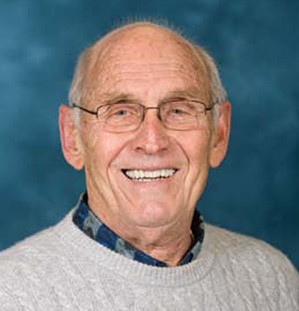
After thirty years of teaching, research, mentoring, and advising, Charles Wolfson retired from the School of Social Work in 1991. Seventeen years later, Wolfson is an active retiree who is still engaged with social work colleagues and concerned about the field of criminal justice that initially brought him into the profession. More importantly, he is still teaching, although nowadays his students are his nine grandchildren, who range in age from three to twenty.
Wolfson did not set out to be a teacher. A native New Yorker, Wolfson’s initial interest was in sociology, his undergraduate major at Long Island University, and then criminal justice and management, which he studied at New York University. When he started looking for employment, he was encouraged to first obtain an MSW degree. He applied to the National Jewish Welfare Board and was offered scholarships to study in Boston and Detroit. Wayne State University offered him $200 more, so he moved to Detroit.
In his first post-MSW job, Wolfson supervised students at the Detroit Neighborhood Service Organization. It was there that he met Professor Robert Vinter, who was the School of Social Work’s liaison to that agency. Vinter was about to take a sabbatical and encouraged Wolfson to join the School and teach courses in criminal justice. In 1961 Wolfson joined a distinguished group with expertise in that area, including Dean Fedele Fauri, Vinter, Rosemary Sarri, and later Tom Croxton. He also worked collaboratively in an expanding group work program with Charles Garvin, Paul Glasser, and Harvey Bertcher.
Wolfson was a natural teacher. He taught classes in Human Service Organizations and Social Deviance, and he wrote the textbook Social Deviance and the Human Services (1984). In 1962 he became director of field instruction, a job that he held, on and off, for many years. He jokes, “I had a lot of influence but little in the way of reward. I kept leaving, but they would always ask me back.” In reality, Wolfson thrived on these interactions with students.
Wolfson is also renowned for his contributions to multiple research projects in the field of criminal justice. He worked on several major studies, including a comparison of closed institutions and community programs, and a four-state study of structural design in juvenile courts.
In 1987 Wolfson was invited by U.S. District Court Judge John Feikens to be an expert on a project to examine the rights of inmates in state prisons in southern Michigan. He worked with Jerold Israel, from the Law School, to assess the grievance procedures in the prisons and was astonished by the squalid conditions in the prisons. Wolfson learned that neither prisoners nor wardens had any faith in the credibility of the grievance procedure. He prepared a report with detailed recommendations on how to remedy these problems and was proud that the judge accepted all of them.
According to Rosemary Sarri, “Chuck Wolfson was a wonderful colleague who made a major impact at the School and in the profession. He was a dedicated teacher and advisor who was committed to students. He made a significant contribution training social workers to work in juvenile and adult criminal justice settings.”
Nowadays, Wolfson and his wife Marcia, whom he met when she was the executive director of Family Service and Children’s Aid in Jackson, travel to a second home in California and visit their children and grandchildren. Just as he used to look forward to those occasions when he taught classes with only nine or fewer students, he finds that teaching this number of grandchildren is a responsibility that is most gratifying.
When asked what the social work profession and School have given him, Wolfson says, “U-M broadened my horizons. I had the opportunity to work with judges, agency directors, and others with influence in shaping social policy. What more could I want?”
—Robin Adelson Little works at the U-M Exhibit Museum of Natural History. She is also a freelance writer and past editor of Ongoing.